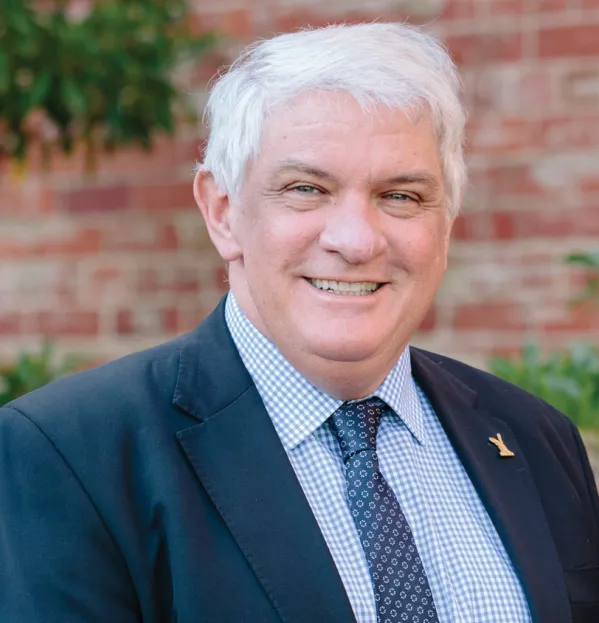TES talks to... Michael Carr-Gregg

“Kids these days,” people scowl, “they don’t know how to stand on their own two feet, they are always wanting more for less and they want praise for doing basic tasks.”
It is likely that few teachers will see the next generation quite so negatively.
While they may agree with the symptoms identified - anecdotally, many teachers report an increase in students struggling with many aspects of life - the attitude of the teaching profession is not to criticise or disparage, but to try and find out why students are struggling so that issues can be overcome. Teachers want to know how can they do that better.
One of Australia’s most respected child psychologists Michael Carr-Gregg is often asked this question and for him, the answer is simple: good teachers do enough already.
The people who really need to up their game if we are to help young people are parents.
And he should know: Carr-Gregg has long been a loud and informed voice on the subject of student wellbeing.
In addition to 30 years of experience as a child psychologist, he is the managing director of The Young and Well Cooperative Research Centre, which runs an online curriculum for teachers, who can study to receive a Certificate in Young People’s Mental Health and Technology. He also helped to form the Australian Learning and Wellbeing Framework for schools.
Anxiety at all-time high
The fact that young people are more stressed now is difficult to argue with, says Carr-Gregg.
“Australian research indicates quite clearly that this generation is not coping,” he explains. “Rates of depression and anxiety in both primary and secondary school students are at an all-time high.
“Many teachers report that primary school students become acutely anxious with some actually vomiting and others electing not to attend school when high-stakes testing is on.”
Teachers are feeling pressure to get students ready for tests, parents are feeling pressure to have their children perform above average.
This pressure then travels all the way down onto the kids themselves, he explains.
“A recent survey of high school students revealed 31 per cent were suffering symptoms of depression and 41 per cent symptoms of anxiety,” he says.
The author of nine books, with an update on his bestselling The Princess Bitchface Syndrome due out in December this year, Carr-Gregg says mental health issues are coming to the forefront of children’s growing-up phase with a rise in suicidal behaviours and deliberate self-harm.
But, that’s not to say children have become less resilient.
“As I think back over the years and remember the young people who have sat before me, I think of the thousands of young minds that needed help negotiating a world that contains more risk factors than protective and that can sometimes be overwhelming, cruel, and at times, abusive.
“Despite the fact that many were treated as if they were made of glass, these children, who came along in all shapes, sizes and personalities displayed significant levels of resilience and often amazed me with their courage and honesty.”
What children and young people who experience problems need, he explains, is to feel safe, valued and listened to.
“They crave closeness and comfort; finding security in a routine and non-conditional acceptance,” he says.
‘The tail is wagging the dog’
While teachers are important in this security process, he believes that the main focus in tackling the teenage mental health crisis should be on parents.
“I think the biggest change has been in parenting: the tail seems increasingly to be wagging the dog. I see that now more often than ever before.
“More and more children seem to be in charge of their own lives, more worried about pleasing their friends than listening to or respecting their parents. Their wish lists become “must have” or “must do” lists, because to deprive a child of an iPad, let alone make them attend a “boring” family function, religious or carol service, is seen by many as akin to cruelty, neglect and abuse.
Parenting with a loving but firm hand is increasingly rare
“My view is that parenting with intelligence, with a loving but firm hand, is increasingly rare,” he adds.
The media narrative, of course, suggests that the issues causing teenage mental health difficulties and the solution for them all reside in schools. Carr-Gregg says that, in fact, parents are the biggest factor in both.
“While it is counterproductive for parents to be in the faces of their children 24/7, it is vital that they are supportive, make them feel safe, valued and trusted and, above all, that they know where they are, who they are with and what they are doing. They need boundaries and rules if they are to learn right from wrong.”
Essentially, the key to tackling the teenage mental health crisis is not asking schools to do more - rather, it is asking parents to become more like schools.
Brittany Vonow is a freelance writer based in London. She tweets at @bvonow
Share this article on Facebook or Twitter with #ToYouFromTES to be entered into a draw to win a TES digital subscription for 2017.
You need a Tes subscription to read this article
Subscribe now to read this article and get other subscriber-only content:
- Unlimited access to all Tes magazine content
- Exclusive subscriber-only stories
- Award-winning email newsletters
Already a subscriber? Log in
You need a subscription to read this article
Subscribe now to read this article and get other subscriber-only content, including:
- Unlimited access to all Tes magazine content
- Exclusive subscriber-only stories
- Award-winning email newsletters